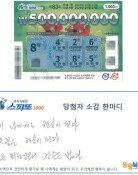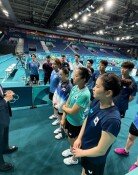Park Heon-yeongs Daughter, Park Vivianas Moscow Interview
Park Heon-yeongs Daughter, Park Vivianas Moscow Interview
Posted February. 29, 2004 22:57,
Its not only my familys tragedy but also an irony of history that my parents, who spent their whole lives for the communist revolution, were purged in North Korea and the old Soviet Union.
Danilov public cemetery is located in Moscows downtown in Russia. This is the place where Ju Se-juk (1901-1953), a well-known woman socialist activist was buried. She is a wife of the leader of the Nam-ro party, Park Heon-yeong, who was purged and accused of being a U.S. secret agent in 1953 while serving as a Deputy Prime Minister and also the Foreign Minister of the North Korea.
The couples only daughter, Park Viviana, (aged 76), a dancer living in Moscow, could not forget her parents tragic deaths even after half a century has passed.
Parks survival was known in Korea in 1991 after the opening of the old Soviet Union. She has refused to contact with the media as she felt annoyed by attitude of some of them. But she changed her mind upon her husbands (Victor Markov) death last year, and recently agreed to an interview with Dong-A Ilbo and decided to open her tragic family history in the hopes that it would not be too late.
My mother died of illness when she secretly came to Moscow to see me in 1953, while she was exiled in Central Asia by the Stalin regime and charged with being a dangerous person in 1938. My husband attended her deathbed because I was on my local tour. She might be better off than my father because she had her tomb at least.
Park Heon-yeong was only known to have been executed in December, 1955. The fate of his son and daughter, between his third wife, Yoon Lena, who married him in North Korea, has not yet been known as well.
Park was born in the far eastern city of Vladivostok, when her parents were escaping from Japans chase. She grew up in an orphanage because her parents could not take care of her as they concentrated on social revolution.
My mother visited me sometimes, but I couldnt remember fathers face when I was a child.
She lost contact with her father after Park Heon-yeong was arrested by Japan in 1938. She even knew the fact that her father was known as Choseon Communist Party leader Park Heon-yeong in 1946. She recollected that it was too unfamiliar when she met her father as he visited the Soviet Union. She had learned Korean dancing from Choi Seung-hee, a dancer who went to North Korea, staying in Pyongyang for a while in 1949.
It was the last time I saw him when I came back to Moscow, refusing his suggestion of living together.
She said she was thrilled even now thinking that she must have been executed as well if she remained there at that time.
He did not ask anything about mother when he met me.
Park Heon-yeong seems to be uneasy in that his wife suddenly attracted peoples attention, as she was purged and exiled by the Soviet authorities. Although Ju Se-juk asked Stalin for her release in May, 1946, saying, Ill go back home and help my husband, the Soviet authorities ignored the request.
Park Heon-yeong cleared his relationship with Ju Se-juk by remarrying in 1949. According to Parks words, her step-mother Yoon gave birth to a second child, Sergey, staying in Moscow in 1952 when the Korean war was at its height. Park looked after her step-brother and step-sister at that time. She said, Id like the North Korean government to let me know just their life or death.
Park has hated communism all her life due to her tragic family history. She even refused to join the Communist party. He mother, who brought a tragic life upon herself because of a self-selecting ideology, even said, It is fortunate that you chose dance and married a painter who is not concerned with politics.
Ju Se-juk righted herself by the old soviet Union in 1989. Park finished her interview by saying, Id like to see a day when my father is estimated justly in history.
Ki-Hyun Kim kimkihy@donga.com







